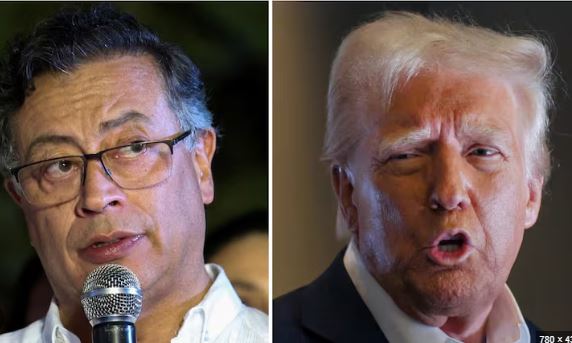The recent agreement between Colombia and the United States regarding the acceptance of deportation flights underscores the complexities of international relations and domestic politics. Initially, Colombian President Gustavo Petro resisted the idea of accepting deported migrants from the U.S., citing concerns about their treatment upon return . This refusal prompted a strong response from former President Donald Trump, who threatened to impose tariffs as high as 50% on Colombian goods. Such measures were indicative of Trump's broader strategy to leverage economic pressure in negotiations with foreign governments. The situation exemplifies how diplomatic relations can be influenced by economic sanctions and threats, often leading to significant changes in policy stances.
Under threats from President Trump that included steep tariffs, President Gustavo Petro of Colombia has relented and will allow U.S. military planes to fly deportees into the country, after turning two transports back in response to what he called inhumane treatment.
The two leaders had engaged in a war of words on Sunday after Colombia’s move to block Mr. Trump’s use of military aircraft in deporting thousands of unauthorized immigrants.
But on Sunday night, the White House released a statement in which it said that because Mr. Petro had agreed to all of its terms, the tariffs and sanctions Mr. Trump had threatened would be “held in reserve.” Other penalties, such as visa sanctions, will remain in effect until the first planeload of deportees has arrived in Colombia, the statement said.
Trump’s victory over Colombia capped the first week of his presidency, during which he used intimidation as a device to stamp his power on the United States at home and to sharply change the nation’s path abroad.
On Sunday, for instance, Trump’s new administration launched a deportation blitz in Chicago that will spread countrywide in the latest highly visible sign of his desire to quickly get results.
White House border czar Tom Homan Say Priscilla Alvarez Sunday that the new multiagency approach on immigration enforcement was a “game-changer.”
The resolution of this dispute highlights a delicate balance between national sovereignty and international obligations. While Colombia's initial stance was rooted in humanitarian concerns, Trump’s tariff threats significantly shifted the dynamics . Ultimately, after intense negotiations, both parties reached an agreement that allowed for deportation flights under conditions that ensured respect for human dignity. This compromise not only avoided an escalating trade war but also reflected a pragmatic approach by Colombia to safeguard its economic interests while addressing pressing migration issues . Furthermore, this incident illustrates how intergovernmental agreements are often shaped by power imbalances and strategic bargaining tactics.
In conclusion, the agreement on deportation flights between Colombia and the U.S. serves as a case study in modern diplomacy where economic threats can compel nations to alter their policies significantly. It raises questions about ethical considerations in international relations and highlights the potential ramifications for countries like Colombia that navigate complex geopolitical landscapes while striving to protect their citizens' rights . As global migration continues to present challenges worldwide, such agreements will likely remain contentious yet necessary components of bilateral relations.
Read more
Chinese AI startup DeepSeek surpasses ChatGPT in the Apple App Store. Pharmacists warn against weight-loss jab online sales.Sarah H
Also on site :
- Zohran Mamdani wins New York City mayoral primary after Cuomo concedes
- Heat Wave Sweeps Across U.S. With Record Temperatures Expected Today
- Mysterious Transmission Detected From NASA Satellite Silent Since the 1960s

